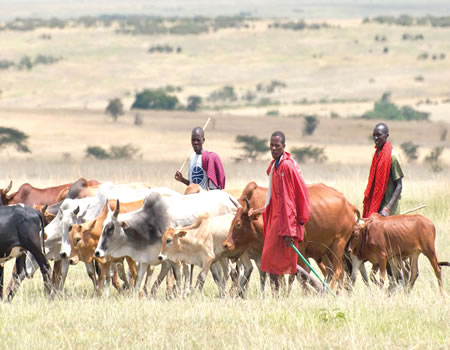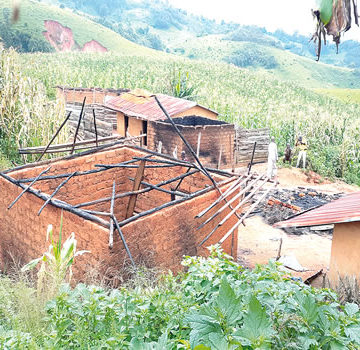ON Sunday, 18 June, a fight broke out between the Mambilla and Fulani communities in Sardauna Local Government Area of Taraba State and continued for days, claiming several lives and varying degrees of destruction to property and livestock.
Officially the story was that the crisis erupted due to the arrest of a Mambilla man by men of the Nigerian police following a court order to that effect.
The case is said to be a fallout of a land dispute between a Mambilla man and a Fulani man that eventually ended in the favour of the Fulani man. Following his arrest, his kinsmen alleged that the Fulani were responsible for the arrest of their kin resulting in an attack against the Fulani and the carnage began.
However, Sunday Tribune investigations revealed that the crisis is not unconnected to the ongoing debate in the state over the anti grazing Bill currently before the state Assembly.
The Miyetti Allah Cattle Breeders Association had, a week earlier, staged a protest to the state Assembly calling for the dropping of the Bill, describing it as “malicious, obnoxious and targeted” at its members adding that should the bill allowed to become law, there would be chaos in the state.
During their march to the House, Fulani group was received and addressed by the Speaker of the state Assembly, Honorable Abel Peter Diah, who advised them to take advantage of the public hearing organized by the House to present their case.
Diah, however, warned that the House would not be blackmailed into ignoring its statutory responsibilities just to please a microscopic section of the state as “the state is bigger and more significant than any group within it.”
While educating the protesters, the Speaker pointed out that ranching and controlled grazing on the Mambilla Plateau has saved the area from the incessant herders and farmers crises being experienced in other parts of the state and wondered that people who had ranched their own cows still joined the protest.
This was the tension already in the air, thus the arrest of the Mambilla man was the last straw that broke the fragile peace in the area.
According to our source in the community, who spoke on condition of anonimity, the Fulani were not happy with the Anti Grazing Bill and were ready to frustrate it. The Mambilla community also was ready to use everything at their disposal to checkmate the Fulani. So it was jus t a matter of time before a major crisis broke out.
When the opportunity presented itself, the fight happened quickly and very fast before any meaningful intervention by the security agencies, who had denied any connection between the bill and the crisis.
However, the crisis had elicited responses from some stakeholders in the state. Senator Yusuf Abubakar, representing the area in the National Assembly, in a briefing, accused the state governor of indifference to the crisis. A group of elders from the local government have also accused the governor of not empathizing with the victims’ families.
Also an indigene of the state who is also the Minister of Women Affairs and Social Development, Senator Aisha Alhassan, condemned the governor for not coming to the aid of the people, called for his impeachment, vowing to support the state assembly should they commence the process.
In response, Governor Ishaku referred to his accusers as detractors “who are bent on using the lives of the people for their political gains.”
Furthermore, the Senior Special Assistant to the governor on Public Affairs, Emmanuel Bello in a press statement said that the governor was “more concerned with bringing a lasting solution to the crisis and providing succour to the affected persons, than joining issues with political scavengers.”
Bello said that in resolving the crisis, the governor had earlier set up a high profile committee headed by the deputy governor to look into the land disputes on the Mambilla plateau and find ways of resolving them amicably, before the crisis broke out.
He added that the state government had also contacted the traditional rulers in the area and was in constant touch with them to ensure that security agents did their work without hindrance, noting that the state government has deployed two truckloads of relief materials to victims of the crisis, while assuring that it was ready to do more.
“It calls for concern why all the attention is drawn to this particular crisis while worse attacks in the state went without a single action from the federal government. Attacks in Karim, Lau, Takum, Bali and other parts of the state recorded higher casualty numbers and worse destruction of property, but no one called for imposition of a state of emergency on the state. No ministers came to commiserate with the people. Senators who had no voice have suddenly become very vocal. Is it that some lives are more important than others?” he queried.
As it is, the peace in Mambilla could be described as a fragile one. The Wakilin Fulani, Alhaji Saidu Bawa has warned that any effort to take over the lands belonging to his people would be resisted while the Mambilla people are also of the opinion that their lands, illegally acquired by the Fulani under the pretext of grazing their cattle must be returned to enable them farm and build on.
The crisis has undoubtedly pitted the Mambilla people and the Fulani against themselves, standing eyeball to eyeball. It is difficult to say who would blink first.
Eyeball to eyeball: Why Mambilla/Fulani crisis may remain unresolved








